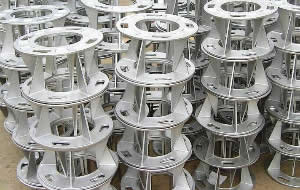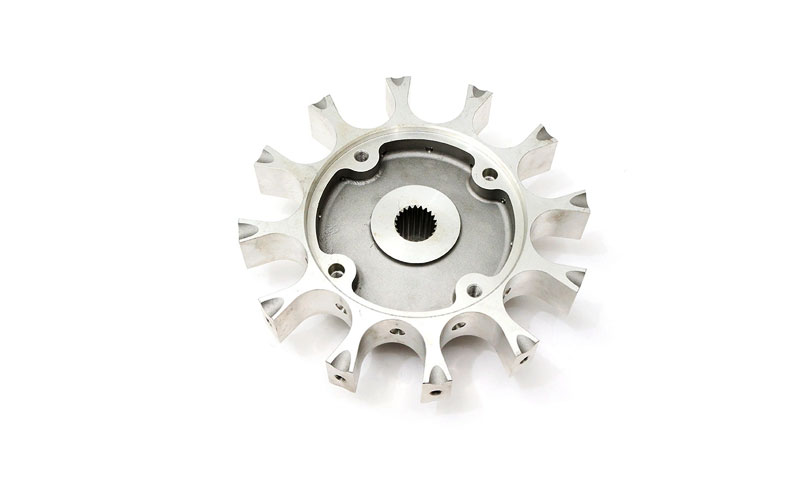Leading Industries that Benefit from Aluminum Casting Company
Discover the Advantages of Aluminum Casting in Modern Production
Aluminum casting has emerged as an essential procedure in modern production. Its light-weight yet durable nature presents significant benefits for numerous markets. The capability to attain intricate styles and preserve limited resistances adds to its appeal. aluminum casting. Furthermore, the cost-effectiveness and ecological advantages make it a sustainable option. As suppliers seek innovative solutions, the function of aluminum casting remains to advance. What certain applications and advantages wait for expedition in this dynamic area?
Light-weight Yet Strong: The Advantages of Aluminum
Several materials are utilized in production, aluminum stands out due to its impressive combination of lightweight residential or commercial properties and extraordinary strength. This unique attribute makes aluminum an excellent option for different applications, particularly in sectors such as automobile, aerospace, and construction. Its reduced density permits less complicated handling and transport, adding to lowered energy consumption during manufacturing and assembly processes.
Aluminum's strength-to-weight proportion is remarkable, allowing manufacturers to develop long lasting parts without adding unnecessary mass. This characteristic is specifically important in fields where weight reduction can lead to enhanced gas effectiveness and overall performance. In addition, aluminum's resistance to rust boosts the durability of items, even more strengthening its charm in modern-day manufacturing.
Inevitably, the lightweight yet solid nature of aluminum positions it as a preferred product, fostering innovation and efficiency across multiple industries. Makers progressively recognize that these benefits can bring about significant innovations in design and performance.
Precision and Intricacy in Design
As makers welcome the capabilities of aluminum casting, they find brand-new opportunities for precision and intricacy in design. This production process enables for the creation of intricate forms and detailed functions that typical approaches usually struggle to achieve. The fluidity of molten aluminum enables it to fill up intricate mold and mildews, resulting in parts with limited resistances and great surface area finishes.
This precision is especially beneficial in industries such as aerospace and vehicle, where specific specifications are necessary for performance and safety. Aluminum casting likewise fits innovative styles that improve performance without endangering architectural honesty.

Cost-Effectiveness and Effectiveness
Cost-effectiveness and effectiveness are critical factors to consider for suppliers exploring aluminum casting as a manufacturing approach. Aluminum casting offers considerable cost advantages as a result of its lower product costs contrasted to other metals (aluminum casting). The lightweight nature of aluminum minimizes shipping and handling costs, and its superb thermal conductivity enables quicker cooling times during the casting procedure, improving total production speed
In addition, aluminum's adaptability makes it possible for manufacturers to produce intricate shapes and designs, lessening the demand for added machining or assembly. This streamlining of manufacturing not just lowers labor prices yet likewise reduces lead times, allowing companies to respond promptly to market needs.
Additionally, the toughness and corrosion resistance of aluminum spreadings add to longer product life expectancies, lowering substitute expenses gradually. Therefore, makers can achieve an equilibrium of premium output and decreased operational expenditures, making aluminum casting a progressively appealing alternative in contemporary manufacturing.
Environmental Sustainability of Aluminum Casting
Aluminum casting attracts attention as an eco lasting manufacturing option, particularly as a result of its recyclability and lowered environmental footprint. The procedure enables for the efficient usage of aluminum, a product that can be recycled forever without shedding its properties. This characteristic considerably reduces the need for virgin aluminum, thus saving natural deposits and lessening power consumption connected with removal and processing.

Applications Across Industries: From Automotive to Aerospace
While diverse sectors remain to look for cutting-edge materials for manufacturing, aluminum casting has actually shown to be a versatile solution across markets such as auto and aerospace. In the auto industry, aluminum spreadings add to lightweight car designs, improving gas efficiency and performance. Elements like engine blocks, transmission housings, and wheels benefit from aluminum's strength-to-weight ratio.
In aerospace, aluminum casting plays a significant function in generating complex parts that call for high sturdiness and low weight. Airplane components such as braces, touchdown gear, and architectural frames make use of aluminum for peak performance and safety and security.
In addition, the adaptability of aluminum casting permits it to deal with various other markets, including customer electronic devices, marine, and commercial equipment. This adaptability not only satisfies the specific requirements of different applications yet likewise supports recurring development in manufacturing processes. Therefore, aluminum casting remains a vital gamer in modern production throughout numerous fields.
Often Asked Inquiries
Exactly How Does Aluminum Casting Contrast to Various Other Metal Casting Processes?
Aluminum casting deals remarkable strength-to-weight ratios, faster air conditioning prices, and exceptional corrosion resistance contrasted to other steel casting procedures. These advantages make why not check here it perfect for different applications, improving effectiveness and performance in production.
What Are the Normal Lead Times for Aluminum Casting Projects?
Regular preparation for aluminum casting tasks vary from 2 to 8 weeks, relying on variables such as complexity, order dimension, and manufacturing capability. Effective planning can help reduce delays and enhance task timelines.
Can Aluminum Casting Be Utilized for Intricate Designs?
Aluminum casting can without a doubt accommodate complex layouts. aluminum casting. Its fluidity permits for thorough patterns and shapes, making it ideal for additional info complex parts in various industries. This adaptability enhances design freedom while preserving structural integrity and performance
What Post-Processing Options Are Readily Available After Aluminum Casting?
Post-processing alternatives for aluminum casting consist of machining, brightening, surface treatments, anodizing, and welding. These strategies boost the surface, boost dimensional accuracy, and increase rust resistance, thus optimizing the last product's performance and visual appeal.
How Do Temperature Level Modifications Impact Aluminum Casting Quality?
Temperature modifications considerably effect aluminum casting high quality by affecting fluidity, solidification rates, and potential defects. Rapid cooling can bring about increased brittleness, while excessive warmth may cause warping or incomplete filling of mold and mildews throughout casting.
Aluminum casting has arised as a crucial procedure in contemporary production. As suppliers accept the capacities of aluminum casting, they find brand-new methods for precision and intricacy in style. Aluminum casting processes commonly produce less greenhouse gas emissions contrasted to other steel casting methods. While varied markets proceed to seek innovative materials read the full info here for production, aluminum casting has actually verified to be a versatile option throughout industries such as vehicle and aerospace. In the auto sector, aluminum spreadings add to lightweight automobile styles, improving fuel effectiveness and performance.